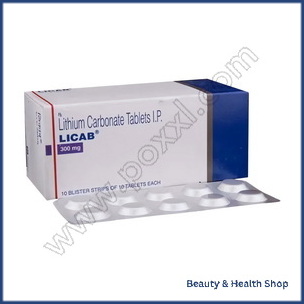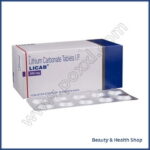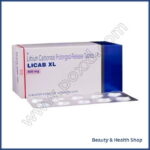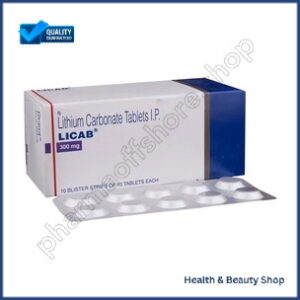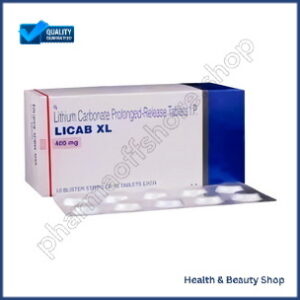ADDICTION
ALCOHOL DEPENDENCE
QUIT SMOKING
ALLERGY
ANTI FUNGAL
FUNGAL INFECTION
FUNGAL NAIL INFECTIONS
ANTI-REJECTION DRUGS
ANTI WORM
ANTIBIOTIC
BACTERIAL INFECTIONS
ARTHRITIS
GOUT
OSTEOARTHRITIS
RHEUMATOID ARTHRITIS
BLOOD
LOW PLATELET COUNT
THROMBOPHLEBITIS
VARICOSE VEINS
COLON
ANAL FISSURE
PILES
ULCERATIVE COLITIS
DIABETES CARE
DIABETES INSIPIDUS
DIABETES TYPE
DIABETIC FOOT ULCERS
GLUCOSE MONITOR
EYES/EAR CARE
DRY EYES
EYE CARE
EYE EXAMINATION
EYE INFECTION
EYE LASHES
EYE PAIN
GLAUCOMA
OCULAR HYPERTENSION
UVEITIS
FEVER CARE
MALARIA
RHEUMATIC FEVER
TYPHOID FEVER
GASTROINTESTINAL
ACIDITY
CONSTIPATION
CROHN'S DISEASE
DIARRHOEA
GALLBLADDER STONES
INTESTINAL ULCERS
IRRITABLE BOWEL SYNDROME
MOTION SICKNESS
NAUSEA
Licab (Lithium Carbonate)
Licab 300 mg (Lithium Carbonate)
Licab Xl 400 mg (Lithium Carbonate)
| Active Ingredient (Generic Name): | Lithium Carbonate |
|---|---|
| Indication: | Mania, Bipolar disoder |
| Manufacturer | Torrent Pharmaceuticals Ltd |
| Packaging: | 10 tablets in one strip |
From: $49.00
Licab, also known as Lithium Carbonate, stabilizes mood, manages bipolar disorder, and decreases depressive episodes by regulating brain neurotransmitters like serotonin and norepinephrine. Follow your healthcare provider’s dosage instructions carefully. Swallow tablets whole and don’t alter the dose without consulting them. Licab is used for schizoaffective disorder and recurrent depression under professional guidance. Regularly monitor blood pressure, stay hydrated, and maintain a stable diet to avoid side effects like hand tremors, excessive thirst, or weight gain. Seek medical advice in case of missed doses or overdose. Adhere to guidelines closely to guarantee effective management of your condition. Additional information can provide a more thorough understanding.
To understand the benefits of Licab (Lithium Carbonate), start by exploring its mechanism of action in the brain. Licab functions by modulating the levels of certain neurotransmitters, which are chemicals that transmit signals in the brain. Specifically, Licab alters the levels of neurotransmitters like serotonin and norepinephrine, which play vital roles in regulating mood, emotions, and behavior.
By affecting these neurotransmitters, Licab helps stabilize mood and reduce the symptoms of certain mental health conditions. For individuals with bipolar disorder, Licab can help control manic episodes, preventing them from becoming too severe. Additionally, Licab may also reduce the frequency and intensity of depressive episodes in bipolar disorder.
Understanding how Licab works at the neurological level provides insight into its effectiveness in managing mood disorders. By targeting specific neurotransmitters involved in mood regulation, Licab can help individuals achieve greater stability and improved quality of life. This mechanism of action underscores the importance of Licab in the treatment of bipolar disorder and other related conditions.
Why is this medication prescribed?
Licab (Lithium Carbonate) is prescribed to help manage mood disorders such as bipolar disorder by modulating neurotransmitter levels in the brain. Bipolar disorder is a mental health condition characterized by extreme mood swings that include emotional highs (mania or hypomania) and lows (depression). Lithium carbonate works by stabilizing these mood swings, reducing the frequency and severity of manic episodes, and preventing the recurrence of depressive episodes. It helps to balance the levels of certain neurotransmitters in the brain, such as serotonin and norepinephrine, which play a vital role in regulating mood, behavior, and emotions.
In addition to bipolar disorder, Licab may also be prescribed for other mental health conditions, including schizoaffective disorder and recurrent depression. It is important to follow your healthcare provider’s instructions carefully when taking Licab to achieve the best results and minimize potential side effects. Remember to never adjust your dosage or stop taking the medication without consulting your doctor first.
How should this medicine be used?
When using this medication, carefully follow the instructions provided by your healthcare provider to guarantee proper dosage and effectiveness. Licab, or Lithium Carbonate, is typically taken by mouth with or without food as directed by your doctor. It is essential to swallow the tablets whole and not crush or chew them. Your dosage will be based on your medical condition, response to treatment, and blood levels of lithium. To maintain a consistent level of lithium in your body, it is important to take Licab at the same times each day. It is vital not to change the dose or stop taking this medication without consulting your healthcare provider, as sudden changes can lead to serious side effects. Regular blood tests may be required to monitor your lithium levels and ensure the medication is working effectively. If you have any questions or concerns about how to use Licab, do not hesitate to reach out to your healthcare provider for clarification and guidance.
Other uses for this medicine
If recommended by your healthcare provider, this medication may also be used for conditions other than those listed in the official prescribing information. Off-label uses of Licab, or lithium carbonate, may include the treatment of certain types of depression, such as bipolar depression or treatment-resistant depression. Additionally, some healthcare providers may prescribe Licab for managing aggressive behavior in certain psychiatric conditions. It can also be used in combination with other medications to help stabilize mood swings in individuals with bipolar disorder.
While these off-label uses are sometimes considered when other treatments have not been effective, it is important to follow your healthcare provider’s guidance closely. They will determine the appropriate dosage and monitor your progress to make sure the medication is safe and effective for your specific condition. It is essential not to self-prescribe Licab for these off-label uses, as its effects can vary based on individual health factors. Always consult your healthcare provider for personalized treatment recommendations.
What special precautions should I follow?
Before taking Licab (Lithium Carbonate), remember to regularly check your blood pressure as directed by your healthcare provider. It is important to keep track of your blood pressure levels to make sure they remain within the safe range while using this medication. Monitoring your blood pressure will help to prevent any potential complications associated with lithium treatment.
Check Your Blood Pressure
Why should you regularly monitor your blood pressure while taking Licab (Lithium Carbonate)? Monitoring your blood pressure is important due to the following reasons:
- Risk of Hypertension: Licab can cause high blood pressure as a side effect, increasing the risk of hypertension-related complications.
- Maintaining Adequate Levels: Regular monitoring helps guarantee that your blood pressure stays within a safe range, preventing potential health issues.
- Adjusting Dosage: Changes in blood pressure may require adjustments to your Licab dosage, which can only be determined through consistent monitoring.
What special dietary instructions should I follow?
To maintain stable lithium levels in your body, follow specific dietary instructions while taking Licab (Lithium Carbonate). It’s crucial to uphold a consistent level of salt intake in your diet while on this medication. Changes in your salt intake can impact how your body absorbs and processes lithium. So, strive to keep your salt consumption steady and avoid sudden increases or decreases.
Additionally, make sure to stay hydrated by drinking an adequate amount of fluids throughout the day. Lithium levels can be influenced by your body’s hydration status, so it’s vital to drink enough water to help maintain stable levels of the medication in your system.
Furthermore, aim to maintain a consistent intake of caffeine and alcohol while on Licab. Sudden changes in your consumption of these substances can also affect how your body processes lithium. It’s advisable to discuss any significant dietary changes with your healthcare provider to guarantee the effectiveness of your treatment with Licab.
What should I do if I forget a dose?
If you forget to take a dose of Licab, seek guidance from your healthcare provider on the next steps to ensure proper medication management. Missing a dose of Licab can impact the medication’s effectiveness in stabilizing your condition. When you realize you have missed a dose, consult your healthcare provider before taking the skipped dose. They will provide directions on whether to take the missed dose when you remember or skip it and proceed with the next scheduled dose. It is important not to double up on doses to compensate for the missed one, as this can result in an overdose and elevate the risk of side effects. Maintaining a consistent medication schedule is vital for optimal results, so adhere closely to your healthcare provider’s recommendations to sustain the therapeutic levels of Licab in your system. If you frequently forget doses, consider setting reminders or alarms to assist you in staying on track with your medication regimen.
What side effects can this medication cause?
When taking Licab (Lithium Carbonate), it’s vital to be aware of potential side effects. Some side effects can be severe, so if you experience persistent symptoms, inform your doctor immediately. It’s important to seek medical advice if you notice any concerning signs while on this medication.
Persistent Side Effects? Inform Doctor
If you experience persistent side effects while taking Licab (Lithium Carbonate), make sure to inform your doctor promptly. Some side effects commonly associated with Licab include:
- Hand Tremors: Shaking hands can be a common side effect, but it’s vital to monitor if this persists over time.
- Increased Thirst or Urination: If you notice a significant increase in thirst or urination frequency, it’s important to discuss this with your doctor.
- Weight Gain: Some individuals may experience weight gain while on Licab, so keeping track of any changes in weight is crucial for your overall health.
Some side effects can be serious. If you experience any of the following symptoms, call your doctor immediately:
Upon taking Licab (Lithium Carbonate), it’s crucial to be aware that some side effects can be serious, prompting the need to contact your doctor immediately if you experience certain symptoms. These symptoms may include:
- Severe Diarrhea or Vomiting: Excessive diarrhea or vomiting can lead to dehydration, which may be hazardous.
- Muscle Weakness or Twitching: Unusual muscle weakness or twitching could be a sign of toxicity in your body.
- Persistent Tremors: Continuous tremors or shakes that interfere with daily activities should not be overlooked.
If you encounter any of these symptoms or other concerning effects, seek medical assistance promptly. Your doctor can offer guidance on how to address these side effects and safeguard your well-being while taking Licab.
What should I know about the storage and disposal of this medication?
Properly store and dispose of Licab (Lithium Carbonate) to guarantee safety and efficacy. Store this medication at room temperature, away from moisture and heat. Keep it tightly closed in its original container, out of reach of children and pets. Avoid storing Licab in the bathroom.
When it comes to disposal, do not flush Licab down the toilet or pour it into a drain unless instructed to do so. Properly discard this medication when it is expired or no longer needed. Consult your pharmacist or local waste disposal company for guidance on the proper disposal method in your area.
If you have any questions regarding storage or disposal, contact your healthcare provider or pharmacist for further assistance. It is important to follow these guidelines to ensure the medication’s effectiveness and to prevent any potential harm to others or the environment.
In case of an emergency/overdose
In an emergency situation or in the event of an overdose, promptly seek medical attention. Overdosing on Licab (Lithium Carbonate) can lead to serious complications and requires urgent medical intervention. Symptoms of an overdose may include diarrhea, vomiting, drowsiness, muscle weakness, tremors, blurred vision, and even seizures. It is vital not to ignore these signs and to seek immediate help from a healthcare professional or by calling emergency services.
When contacting medical services, be prepared to provide information about the amount of Licab ingested, the time of ingestion, and any symptoms experienced. Emergency treatment for a Licab overdose may involve measures to remove the remaining drug from the stomach, intravenous fluids to maintain hydration, and medications to manage symptoms like seizures or irregular heart rhythms. It is important to never attempt to treat a Licab overdose at home or delay seeking medical assistance, as prompt intervention is essential in preventing serious complications and ensuring your safety.
What other information should I know?
If you are prescribed Licab (Lithium Carbonate), it is important to be aware of certain key information for safe and effective use. Above all, it’s vital to follow your doctor’s instructions regarding dosage and frequency of intake. Do not adjust the dosage without consulting your healthcare provider as this can lead to serious side effects. Additionally, make sure to stay properly hydrated while taking Licab to prevent dehydration, which can affect lithium levels in your body.
Moreover, regular blood tests are necessary to monitor your lithium levels and guarantee they are within the therapeutic range. This range is narrow, so close monitoring is essential to prevent toxicity or inefficacy of the medication. It’s also important to avoid excessive consumption of caffeine and maintain a consistent salt intake in your diet, as these factors can influence lithium levels in your body.
Lastly, inform your healthcare provider about any other medications, supplements, or herbal products you are taking, as they may interact with Licab and impact its effectiveness or increase the risk of side effects.
Brand names
When considering the brand names for Licab (Lithium Carbonate), it’s important to be aware of the various options available in the market. Below is a table outlining some common brand names for Licab:
| Brand Name | Active Ingredient |
|---|---|
| Eskalith | Lithium Carbonate |
| Lithobid | Lithium Carbonate |
| Lithotabs | Lithium Carbonate |
| Priadel | Lithium Carbonate |
| Carbolith | Lithium Carbonate |
Each of these brand names contains the active ingredient Lithium Carbonate, which is the primary component responsible for the therapeutic effects of Licab. Consult with your healthcare provider to determine the most suitable brand name for your specific needs and conditions. Different brands may have variations regarding dosages, formulations, and release mechanisms, so follow your healthcare provider’s guidance when using any of these brand names for Licab.
Purchase From Licensed Pharmacies
Consider purchasing Licab (Lithium Carbonate) only from licensed pharmacies to guarantee the authenticity and quality of the medication. Licensed pharmacies are regulated by health authorities, ensuring that they meet specific standards for storing and dispensing medications. By obtaining Licab from a licensed pharmacy, you reduce the risk of receiving counterfeit or substandard products that may be harmful or ineffective.
Licensed pharmacies also have qualified pharmacists who can provide guidance on the proper use of Licab, including dosage instructions, potential side effects, and drug interactions. They can offer valuable information to help you use the medication safely and effectively, minimizing the likelihood of adverse reactions.
Moreover, purchasing Licab from licensed pharmacies allows for traceability in case of recalls or quality issues. If there are any concerns about the medication you purchased, licensed pharmacies can assist in addressing them promptly and appropriately.
To summarise
For a concise overview, remember the importance of purchasing Licab (Lithium Carbonate) from licensed pharmacies. Licab is a medication commonly prescribed to manage bipolar disorder by stabilizing mood swings. It is essential to adhere to the prescribed dosage and frequency as directed by your healthcare provider. Regular blood tests may be necessary to monitor your lithium levels and guarantee effectiveness while minimizing potential side effects. Remember to stay hydrated while taking Licab and maintain a consistent salt intake in your diet, as dehydration and changes in salt levels can impact lithium levels in your body.
It is vital to be aware of potential side effects such as tremors, frequent urination, and weight gain, among others. Contact your healthcare provider immediately if you experience severe side effects or any new symptoms while taking Licab. Avoid consuming excessive amounts of caffeine or alcohol, as these substances can interact with Licab and impact its efficacy. Always keep your healthcare provider informed about any other medications or supplements you are taking to prevent harmful interactions. By following these guidelines and staying in close communication with your healthcare team, you can effectively manage your condition with Licab.


